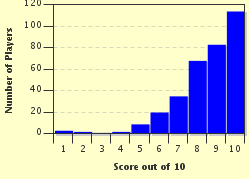Quiz Answer Key and Fun Facts
1. "On that day the Lord made a covenant with ______ and said, 'To your descendants I give this land, from the river of Egypt to the great river, the Euphrates'" (Genesis 15 v. 18).
With whom did God make this covenant?
2. "When two full years had passed, Pharaoh had a dream: He was standing by the Nile, when out of the river there came up seven cows" (Genesis 41 v. 1-2)
Pharaoh became increasingly troubled that no-one was able to interpret his dream. Who, eventually, unlocked its significance?
3. "Then Pharaoh's daughter went down to the Nile to bathe, and her attendants were walking along the river bank. She saw the basket among the reeds and sent her slave girl to get it" (Exodus 2 v. 5).
Who was in the basket?
4. "I will lure Sisera, the commander of Jabin's army, with his chariots and his troops to the Kishon River and give him into your hands" (Judges 4 v. 7).
Sisera was to experience one of the more unusual deaths in the Bible. How did he die?
5. "Then the word of the LORD came to ________: 'Leave here, turn eastward and hide in the Kerith Ravine, east of the Jordan. You will drink from the brook, and I have ordered the ravens to feed you there'" (1 Kings 17 v. 2-4).
Which prophet was refreshed by ravens whilst remaining by the river in the ravine?
6. "Are you better than Thebes situated on the Nile, with water around her? The river was her defense, the waters her wall." (Nahum 3)
Nahum is prophesying against the Assyrian empire and its capital. Which of the following was the capital of that empire?
7. "By the rivers of ___________ we sat and wept when we remembered Zion ... How can we sing the songs of the Lord while in a foreign land? (Psalm 137 v. 1 and 4)
Here is one of the most significant moments in Israel's history as the people experience life in exile. Where were these rivers?
8. "On the twenty-fourth day of the first month, as I was standing on the bank of the great river, the Tigris" (Daniel 10 v. 4).
Who is speaking these words?
9. "The whole Judean countryside and all the people of Jerusalem went out to him. Confessing their sins, they were baptized by him in the Jordan River" (Mark 1 v. 5).
Whose ministry revolved around baptising people in the Jordan river?
10. "On the Sabbath we went outside the city gate to the river, where we expected to find a place of prayer. We sat down and began to speak to the women who had gathered there." (Acts 16 v. 13)
Luke wrote this passage but which of the following was in Philippi with him?
Source: Author
glendathecat
This quiz was reviewed by FunTrivia editor
CellarDoor before going online.
Any errors found in FunTrivia content are routinely corrected through our feedback system.

